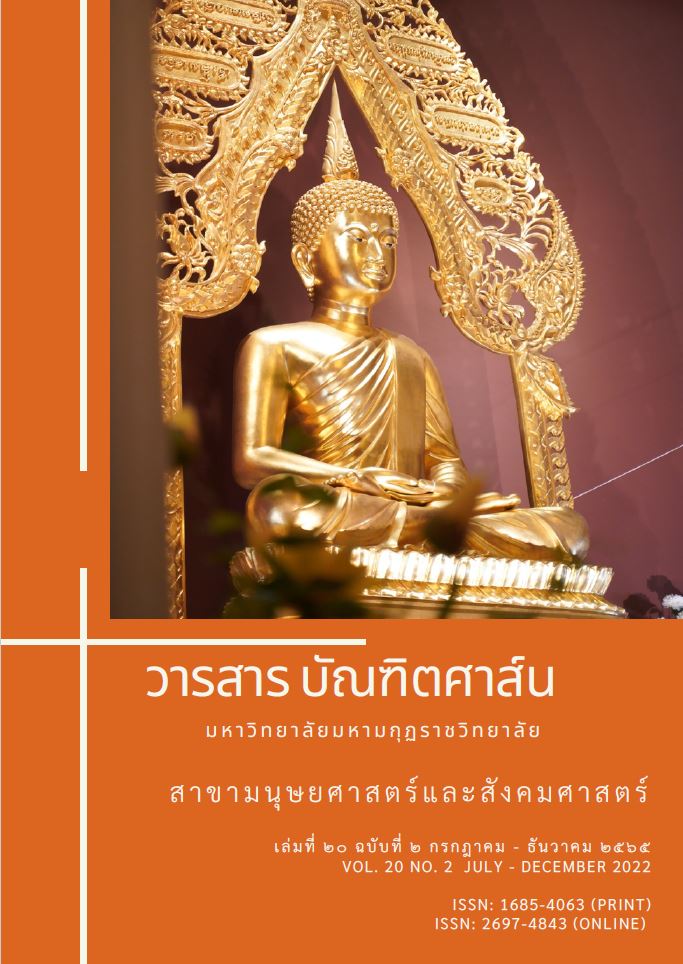ตัวบ่งชี้ภาวะผู้นำการเปลี่ยนแปลงเชิงจริยธรรมของผู้บริหารสถานศึกษาระดับประถมศึกษา สังกัดสำนักงานคณะกรรมการการศึกษาขั้นพื้นฐาน
คำสำคัญ:
ตัวบ่งชี้, ภาวะผู้นำการเปลี่ยนแปลงเชิงจริยธรรม, ผู้บริหารสถานศึกษาบทคัดย่อ
การวิจัยครั้งนี้มีวัตถุประสงค์เพื่อ 1) ศึกษาตัวบ่งชี้ที่เหมาะสมของภาวะผู้นำการเปลี่ยนแปลงเชิงจริยธรรมของผู้บริหารสถานศึกษาระดับประถมศึกษา สังกัดสำนักงานคณะกรรมการการศึกษาขั้นพื้นฐาน 2) เพื่อทดสอบโมเดลตัวบ่งชี้ภาวะผู้นำการเปลี่ยนแปลงเชิงจริยธรรมของผู้บริหารสถานศึกษา ระดับประถมศึกษา สังกัดสำนักงานคณะกรรมการการศึกษาขั้นพื้นฐาน 3) เพื่อระบุองค์ประกอบหลัก องค์ประกอบย่อย ตัวบ่งชี้และค่าน้ำหนักของภาวะผู้นำการเปลี่ยนแปลงเชิงจริยธรรมของผู้บริหารสถานศึกษาระดับประถมศึกษา สังกัดสำนักงานคณะกรรมการการศึกษาขั้นพื้นฐาน 4) เพื่อศึกษาแนวทางการพัฒนาภาวะผู้นำการเปลี่ยนแปลงเชิงจริยธรรมของผู้บริหารสถานศึกษาระดับประถมศึกษา สังกัดสำนักงานคณะกรรมการการศึกษาขั้นพื้นฐาน โดยใช้วิธีการวิจัยแบบผสมผสาน (Mixed Methods Research) กลุ่มตัวอย่างที่ใช้ในการวิจัย คือ สถานศึกษาระดับประถมศึกษา สังกัด สำนักงานคณะกรรมการการศึกษาขั้นพื้นฐาน จำนวนทั้งสิ้น 379 โรงเรียน ผู้ให้ข้อมูลประกอบด้วย ผู้บริหารสถานศึกษาหรือรักษาการ โรงเรียนละ 1 คน จำนวน 379 คน หัวหน้างานโรงเรียนละ 2 คน จำนวน 758 คน รวมผู้ให้ข้อมูลทั้งสิ้น 1,137 คน ได้มาโดยการสุ่มแบบหลายขั้นตอน (Multi-stage Sampling) เครื่องมือที่ใช้ในการวิจัยประกอบด้วย 1) แบบสอบถามเกี่ยวกับภาวะผู้นำการเปลี่ยนแปลงเชิงจริยธรรมของผู้บริหารสถานศึกษาระดับประถมศึกษา สังกัดสำนักงานคณะกรรมการการศึกษาขั้นพื้นฐาน มีค่าความเชื่อมั่น เท่ากับ .98 2)แบบสัมภาษณ์ชนิดมีโครงสร้างใช้เก็บรวบรวมข้อมูลใน ปี พ.ศ. 2563 สถิติที่ใช้ในการวิเคราะห์ข้อมูล ได้แก่ ค่าความถี่ ค่าร้อยละ ค่าเฉลี่ย ส่วนเบี่ยงเบนมาตรฐาน และการวิเคราะห์องค์ประกอบเชิงยืนยัน (Confirmatory Factor Analysis : CFA) โดยใช้โปรแกรมคอมพิวเตอร์สำเร็จรูปทางสถิติ
ผลการวิจัย พบว่า
1) ตัวบ่งชี้ที่เหมาะสมของภาวะผู้นำการเปลี่ยนแปลงเชิงจริยธรรมของผู้บริหารสถานศึกษาระดับประถมศึกษา สังกัดสำนักงานคณะกรรมการการศึกษาขั้นพื้นฐานของทุกตัวบ่งชี้ มีค่าเฉลี่ยอยู่ระหว่าง 3.51 - 4.75 และค่าสัมประสิทธิ์การกระจายอยู่ระหว่าง 3.15 – 19.40 ซึ่งแสดงให้เห็นว่าเป็นตัวบ่งชี้ที่มีความเหมาะสมสามารถคัดสรรไว้ในโมเดลความสัมพันธ์เชิงโครงสร้างทุกตัวเนื่องจากมีค่าเฉลี่ยเท่ากับหรือมากกว่า 3.00 และมีค่าสัมประสิทธิ์การกระจายเท่ากับหรือต่ำกว่า 20 %
2) ผลการวิเคราะห์องค์ประกอบเชิงยืนยันของโมเดลทั้ง 4 โมเดล พบว่าโมเดลการวัดแต่ละองค์ประกอบที่พัฒนาขึ้นจากทฤษฎีและผลการวิจัยที่มีความสอดคล้องกับข้อมูลเชิงประจักษ์ดีมาก และแสดงว่าองค์ประกอบทั้ง 4 องค์ประกอบ คือ การมีอิทธิพลอย่างมีอุดมการณ์เชิงจริยธรรม การสร้างแรงบันดาลใจเชิงจริยธรรม การกระตุ้นทางปัญญาเชิงจริยธรรม และการคำนึงถึงความเป็นปัจเจกบุคคลเชิงจริยธรรม เป็นโมเดลที่มีความสัมพันธ์เชิงโครงสร้างตัวบ่งชี้ภาวะผู้นำการเปลี่ยนแปลงเชิงจริยธรรมของผู้บริหารสถานศึกษา ระดับประถมศึกษา สังกัดสำนักงานคณะกรรมการการศึกษาขั้นพื้นฐาน
3) ค่าน้ำหนักองค์ประกอบ (factor loading) ขององค์ประกอบทุกองค์ประกอบมีค่าเป็นบวกตั้งแต่ค่าตั้งแต่ 0.91-0.95 และมีนัยสำคัญทางสถิติที่ระดับ .01 ทุกค่า เรียงลำดับจากค่าน้ำหนักองค์ประกอบมากไปหาน้อย คือ การกระตุ้นทางปัญญาเชิงจริยธรรม (SL) มีค่าน้ำหนักองค์ประกอบเท่ากับ 0.95 การสร้างแรงบันดาลใจเชิงจริยธรรม(ML) มีค่าน้ำหนักองค์ประกอบเท่ากับ 0.94 การคำนึงถึงความเป็นปัจเจกบุคคลเชิงจริยธรรม (CL) มีค่าน้ำหนักองค์ประกอบเท่ากับ 0.93 และการมีอิทธิพลอย่างมีอุดมการณ์เชิงจริยธรรม (IL) มีค่าน้ำหนักองค์ประกอบเท่ากับ 0.91 ซึ่งค่าน้ำหนักองค์ประกอบ (factor loading) ของทั้ง 4 องค์ประกอบมีค่าเป็นบวก และมีนัยสำคัญทางสถิติที่ระดับ .01 ทุกค่า
4) ผลที่ได้จากการวิเคราะห์ข้อมูลใน 4 องค์ประกอบดังกล่าวข้างต้น ผู้เชี่ยวชาญมีความเห็นในการส่งเสริมสนับสนุนให้ผู้บริหารสถานศึกษานำองค์ประกอบและตัวบ่งชี้ไปใช้ในการบริหารสถานศึกษา ด้วยมีความสอดคล้องและเป็นไปในทิศทางเดียวกันกับผลการวิจัยที่ได้พัฒนาขึ้น
เอกสารอ้างอิง
กระทรวงศึกษาธิการ (2559). แนวทางปฏิรูปการศึกษา. กรุงเทพฯ : สำนักงานปลัดกระทรวงศึกษาธิการ
ธวัช บุณยมณี. (2550). ภาวะผู้นำและการเปลี่ยนแปลง.กรุงเทพฯ: โอเดียนสโตร์.
กรุงเทพมหานคร : เนติกุลการพิมพ์.
นงลักษณ์ วิรัชชัย. (2545). การพัฒนาตัวบ่งชี้สำหรับการประเมินคุณภาพการบริหารและการจัดการ
เขตพื้นที่การศึกษา. กรุงเทพมหานคร: ธารอักษร
พระราชวรมุนี (ประยูร ธมมจิตฺโต). ( 2546 ) คุณธรรมสำหรับนักบริหาร, พิมพ์ครั้งที่ ๒, กรุงเทพมหานคร:
มูลนิธิพุทธรรม.
รัตติกรณ์ จงวิศาล. (2556). ภาวะผู้นำ ทฤษฎี การวิจัย และแนวทางสู่การพัฒนา, กรุงเทพมหานคร: สำนักพิมพ์แห่งจุฬาลงกรณ์มหาวิทยาลัย.
วิโรจน์ สารรัตนะ, (2558) การวิจัยทางการบริหารการศึกษา: แนวคิด แนวปฏิบัติและกรณีศึกษา
พิมพ์ครั้งที่ 4 กรุงเทพมหานคร : ทิพย์วิสุทธิ์
ดาวน์โหลด
เผยแพร่แล้ว
รูปแบบการอ้างอิง
ฉบับ
ประเภทบทความ
สัญญาอนุญาต
ลิขสิทธิ์ (c) 2022 มหาวิทยาลัยมหามกุฏราชวิทยาลัย

อนุญาตภายใต้เงื่อนไข Creative Commons Attribution-NonCommercial-NoDerivatives 4.0 International License.
บทความวิชาการและบทความวิจัยในวารสารฉบับนี้ถือเป็นความรับผิดชอบของผู้เขียนเท่านั้น บทความที่ได้รับการตีพิมพ์ในวารสารบัณฑิตศาส์น ถือเป็นลิขสิทธิ์ของมหาวิทยาลัยมหามกุฏราชวิทยาลัย ตามพระราชบัญญัติลิขสิทธิ์



